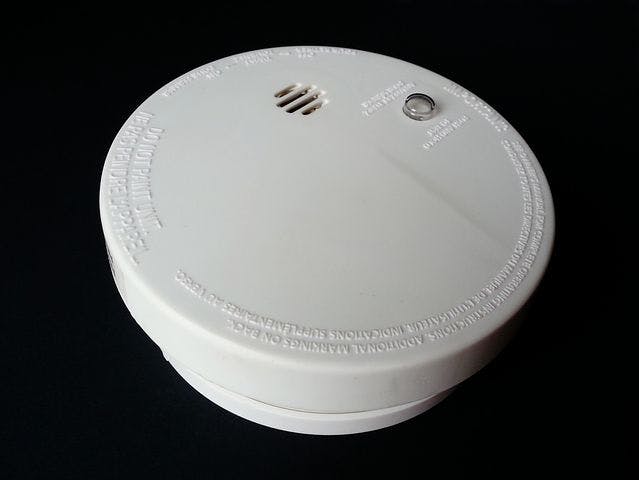We know the sound all too well. Nothing beats being woken in the middle of the night by your smoke detector going off. The incessant beeping can be a huge nuisance, preventing you from sleeping well and from accomplishing your day-to-day tasks. A false alarm can often be caused by dying batteries, but what if you’ve replaced them?
Many people have found that there’s a connection between false alarms and humidity. With summer heating up and knocking at our doors, we decided to take on this pressing question. Can humidity affect smoke detectors? If so, why? And what can you do to prevent this from happening to you?
Short answer: Yes.
Has your smoke alarm ever gone off while you were showering? If not, know that it’s a pretty common occurrence. Steam from the shower can be mistaken by a smoke detector as the beginning of a fire. Turns out heat and moisture aren’t a good combination for this kind of technology. But why does humidity fool a smoke detector?

Why?
Well, that’s the question of the hour. How can something like steam or humidity fool a smoke detector? In short, your smoke detector can’t distinguish moisture particles from smoke because they both set off the sensor in the same way. This begs the question: how do smoke detectors work?
There are two kinds of smoke detectors. Some smoke detectors use photoelectric technology while others use. They work differently and can catch different things. Fire marshals recommend using one that combines both of these technologies. However, using a smoke detector that uses ionization technology is more likely to cause false alarms because of humidity.
How does ionization technology operate?
There are two detector plates in an ionization smoke detector. These detection plates have small amounts of radioactive material in them. This radioactive material ionizes the air between the detector plates, or in other words makes a small electrical current run between them. If there is smoke in the air, the smoke particles will attach themselves to the ionized air molecules. This disrupts the electric current, and as a result, the alarm goes off, warning you that danger may be near.
The problem with ionization technology is that humidity affects it the same way smoke does, causing a lot of false alarms. Humidity can build up in a number of ways. A poorly vented hallway or placing a smoke detector too close to a clothes dryer can create enough moisture to cause a false alarm. These problems get worse in the.m warmer summer months, especially in the southern parts of the United States. Humidity in the air is prone to set off a false alarm. Steam from the shower is visible to the naked eye, meaning it’s even more likely to trigger your smoke alarm.

How to prevent it
Can false alarms from humidity be stopped, or even reduced? What are potential solutions?
We’ve got you covered. Thankfully, yes, these false alarms can be stopped if you take the right precautions. First, check the location of your smoke detectors relative to areas of higher humidity levels in your home. Then, work to decrease the humidity in those parts of your home. Increase ventilation in whatever ways you can. If you have a smoke detector close to your bathroom, make sure to use the exhaust fan while showering. You can also purchase a dehumidifier for your home that will clean the air and remove excess moisture from it. Additionally, make sure to change your air vents four times a year so that they stay fresh and do their part to help ventilate your home. Make sure your kitchen has an exhaust fan to use while cooking, preferably over your stove. This can help absorb excess moisture from cooking. On drier days, consider opening your windows to help fresh, natural air enter your home. If you know your smoke detectors use ionization technology, consider switching to one that employs photoelectric technology. This simple thing can be enough to make the false alarms stop completely.
